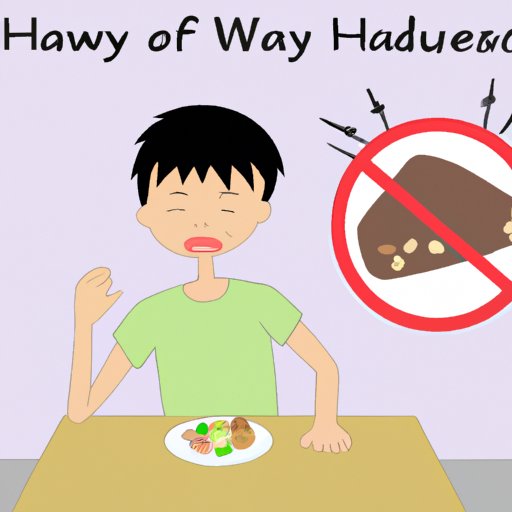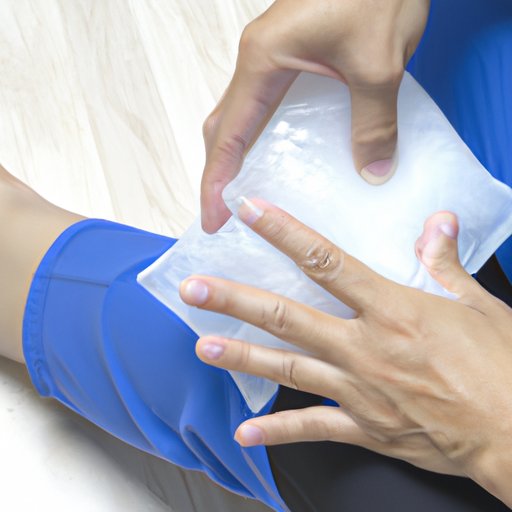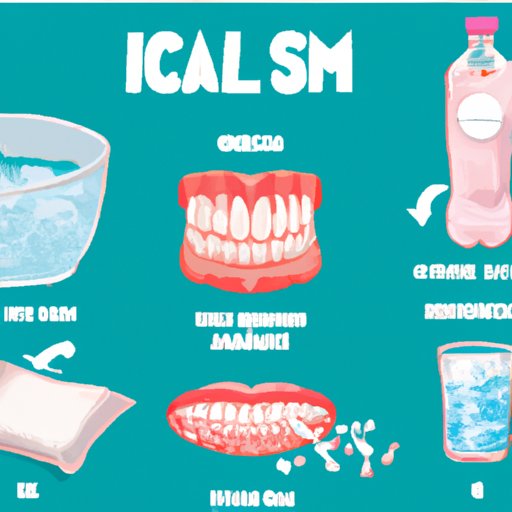Introduction
Swollen gums, also known as gingival swelling, occur when the gums become inflamed due to infection, irritation, or trauma. Swollen gums may be accompanied by redness, pain, bleeding, or tenderness. It is important to take care of swollen gums in order to prevent further health complications.
Rinse with Salt Water
Salt water rinse is one of the simplest and most effective ways to take care of swollen gums at home. Salt water has natural antiseptic properties that can help reduce inflammation and fight bacteria that cause gum disease. Additionally, it can promote healing and reduce discomfort.
Benefits of Salt Water Rinse:
- Reduces inflammation
- Fights bacteria
- Promotes healing
- Reduces discomfort
Steps for Performing Salt Water Rinse:
- Mix ½ teaspoon of salt in 1 cup of warm water.
- Stir until all of the salt is dissolved.
- Gently swish the mixture around your mouth for 30 seconds.
- Spit out the solution and rinse your mouth with clean water.
- Repeat 2-3 times per day.
Use a Soft-Bristled Toothbrush
Using a soft-bristled toothbrush is another easy way to take care of swollen gums at home. A soft-bristled toothbrush is gentler on the gums and will not irritate them further. Additionally, it will help remove plaque and bacteria that can contribute to gum inflammation.
Benefits of Using a Soft-Bristled Toothbrush:
- Gentler on the gums
- Does not irritate the gums
- Helps remove plaque and bacteria
Steps for Using a Soft-Bristled Toothbrush:
- Choose a soft-bristled toothbrush.
- Place the bristles at a 45-degree angle against your gums.
- Gently brush your teeth in a circular motion.
- Brush your teeth for two minutes, twice a day.
- Rinse your mouth with water after brushing.

Avoid Hard and Chewy Foods
It is important to avoid hard and chewy foods when dealing with swollen gums. These types of foods can be difficult and painful to chew, which can further irritate the gums and cause additional inflammation.
Explanation of Why Hard and Chewy Foods Should be Avoided:
Hard and chewy foods are more difficult to chew and can therefore aggravate already swollen gums. Eating these types of foods can cause additional inflammation and discomfort, so it is best to avoid them when dealing with swollen gums.
Examples of Hard and Chewy Foods That Should Be Avoided:
- Chips
- Popcorn
- Nuts
- Chewing gum
- Tough meats
- Candy
Avoid Smoking or Drinking Alcohol
Smoking and drinking alcohol should also be avoided when dealing with swollen gums. Both smoking and drinking alcohol can cause dry mouth, which can lead to an increase in bacteria and further inflammation.
Explanation of Why Smoking and Drinking Alcohol Should be Avoided:
Smoking and drinking alcohol can lead to dry mouth, which can increase the amount of bacteria in the mouth and cause further inflammation. Therefore, it is best to avoid smoking and drinking alcohol when dealing with swollen gums.
Health Risks Associated with Smoking and Drinking Alcohol:
- Increases risk of gum disease
- Increases risk of tooth decay
- Increases risk of oral cancer
- Damages the enamel of the teeth

Apply an Ice Pack or Cold Compress
Applying an ice pack or cold compress to the affected area can help reduce swelling and relieve pain. The cold temperature of the ice pack or cold compress can help numb the area and reduce inflammation.
Benefits of Applying an Ice Pack or Cold Compress:
- Reduces swelling
- Relieves pain
- Numbs the area
- Reduces inflammation
Steps for Applying an Ice Pack or Cold Compress:
- Wrap a few ice cubes in a clean cloth or towel.
- Place the ice pack or cold compress on the affected area for 10-15 minutes.
- Remove the ice pack or cold compress and allow the area to rest for 15 minutes.
- Repeat 2-3 times per day.
Use an Anti-inflammatory Mouthwash
Using an anti-inflammatory mouthwash can also help reduce inflammation and promote healing. The mouthwash can help fight bacteria and reduce pain associated with swollen gums.
Benefits of Using an Anti-inflammatory Mouthwash:
- Fights bacteria
- Reduces inflammation
- Promotes healing
- Reduces pain
Steps for Using an Anti-inflammatory Mouthwash:
- Rinse your mouth with water.
- Pour a small amount of the mouthwash into a cup.
- Gently swish the mouthwash around your mouth for 30 seconds.
- Spit out the solution and rinse your mouth with clean water.
- Repeat 2-3 times per day.
Conclusion
Swollen gums can be uncomfortable and painful. Taking care of swollen gums at home can help reduce inflammation and promote healing. Simple steps for taking care of swollen gums include rinsing with salt water, using a soft-bristled toothbrush, avoiding hard and chewy foods, avoiding smoking and drinking alcohol, applying an ice pack or cold compress, and using an anti-inflammatory mouthwash. However, if symptoms persist, it is important to seek medical attention.
(Note: Is this article not meeting your expectations? Do you have knowledge or insights to share? Unlock new opportunities and expand your reach by joining our authors team. Click Registration to join us and share your expertise with our readers.)
